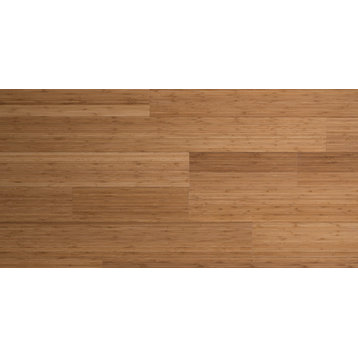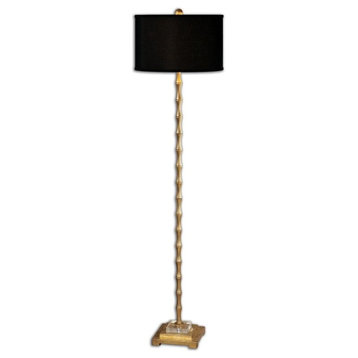FREE shipping on orders over $49!* Details
- All Products
- Home Improvement
- Building Materials
- Flooring
- Bamboo Flooring
Bamboo Flooring
2 Results
Sort by:
Price
2 Results

Vertical Caramelized Bamboo, 20 Square Feetby Stikwood
$200
Free Shipping
A fast-growing grass with wood characteristics, Bamboo is one of the most versatile and sustainable products available today. Its distinctive appearance brings an element of tranquility and freshness to any environment making it the perfect complement to your simple and uncluttered décor.

Classic Gold Metal Bamboo Pole Floor Lamp 65 in Antique Style Black Shade Luxeby My Swanky Home
$388
Free Shipping
Metal bamboo finished in a lightly antiqued gold leaf accented with crystal detail. The round hardback drum shade is a crisp black linen fabric.
- 16"W x 16"D x 65"H. Weighs 18 lbs.
- Hand Finished Metal and Crystal. Linen Fabric Shade.
- UL listed. Uses one max 150W Type A bulb (not included). 3 way socket switch.
- Heirloom Quality - Expertly hand crafted and hand finished. Due to the hand crafted nature of this piece, each piece may have subtle differences.
Bamboo flooring has made a name for itself in the world of floors. This eco-friendly hardwood flooring option is actually a fast-growing grass with no need for replanting, making it highly renewable. Coming from a plant that is naturally designed for strength, bamboo floors can be very durable as well as highly stylish, often closely resembling popular hardwoods. Read further to learn about the pros and cons of bamboo flooring.
Wondering what “stranded” means? Stranded bamboo refers to the process by which fibers are softened and separated, formed into planks under extreme heat and pressure, then coated for protection. This process makes the bamboo flooring two to three times harder than woods such as oak, and is much more durable than regular planks formed directly from the bamboo stalk.
Take your time to figure if bamboo floors are right for your home, and if so, have fun picking out the right style to enjoy for years to come.
Pros of bamboo flooring:
- Inexpensive: Relatively speaking, bamboo floors can be less expensive than other hardwood options, which can help you achieve a similar look without breaking the bank.
- Refinishing: Unlike some flooring options, bamboo floors can be refinished if needed, allowing you to achieve like-new floors without ripping up and replacing them.
- Insect-resistant: Bamboo is naturally resistant to insects, so you won’t have to worry about termites chomping away at your new floorboards.
- Regenerates quickly: - Bamboo is said to be the fastest growing plant on earth, and can be re-harvested every three years without damaging the plant or its environment. In fact, harvesting actually gives the plant a health boost!
- Easy maintenance: No special cleaners required here; simply sweep, vacuum or lightly mop your bamboo floor to keep it clean.
- Moisture-resistant: Especially with the stranded variety, bamboo flooring is resistant to spills, which is a claim most other wood flooring options cannot make.
Wondering what “stranded” means? Stranded bamboo refers to the process by which fibers are softened and separated, formed into planks under extreme heat and pressure, then coated for protection. This process makes the bamboo flooring two to three times harder than woods such as oak, and is much more durable than regular planks formed directly from the bamboo stalk.
Cons of bamboo flooring:
- Prone to scratches: Although it’s a durable material, lower quality products can dent and scratch easily. Look for bamboo that is fully matured, as it will have a higher hardness rating.
- Sensitive to humidity: More so than other flooring materials, bamboo will expand and contract in humid and dry regions, leaving it prone to cracking if the conditions are extreme.
- Fewer colors: Naturally occurring in lighter colors, bamboo floors can also be found in a limited variety of darker shades. Colored products, called carbonized bamboo flooring, undergo additional processing to achieve a desired color, and thus will be softer than non-carbonized options.
- Water damage: While it’s more water-resistant than other wood options, there is always the risk of warping and mold if exposed to excess water or flooding.
Take your time to figure if bamboo floors are right for your home, and if so, have fun picking out the right style to enjoy for years to come.






